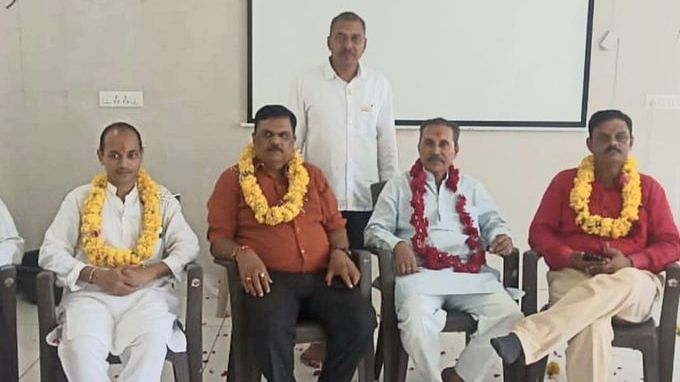Collective arms of denial spring up when India is labelled as having what is called a ‘rape culture’. It is argued as an impossible scenario because India is a land where people worship women as ‘goddess’. Weren’t we united in our angst and in our demand to ‘hang the rapists’ after the 2012 Delhi gang rape? Just see how, among convicts of various crimes, it’s the rapists who are most in danger inside a prison from fellow inmates. The point of these arguments is that we draw the line when it comes to rape convicts. Everyone seemed to agree.
Until of late. Now, we are on an unprecedented path. Within a few months, Indians have accepted rapists back into society—with garlands and sweets. If you think you didn’t, think again. Because that odd tweet of protest doesn’t count.
The 11 men sentenced to life in prison for gang raping Bilkis Bano in 2002 were set free by the Gujarat government in August this year and then felicitated at the office of the Vishwa Hindu Parishad. On Wednesday, Haryana BJP leaders were seen seeking blessings from rape convict Gurmeet Ram Rahim Singh during an online satsang that he held just days after coming out on parole.
In less than a decade, we have travelled from ‘hang the rapists’ to ‘garland the rapists’.
There is no justification for this behaviour, or rather mindset, that both the State and the Indian society have displayed. There simply isn’t one. Welcoming convicted rapists with open arms doesn’t just blur the line that separates decent from foul, it frees the society of any shame, guilt or responsibility to look within and ask where it’s headed, forget reforming itself. The scale to measure the lows have been tossed aside.
Also read: Bilkis Bano rapists release isn’t just Hindu-Muslim issue. BJP leaders telling nobody’s safe
Rapists: they live with us
It would be simplistic to dismiss Ram Rahim’s parole as a political move, keeping in mind the November bypoll in Haryana and assembly election in Himachal Pradesh. Similarly, releasing the 11 men in Gujarat signals an attempt to woo the Hindu vote base for the assembly election in December. But all politics, or political moves, take a cue from how acceptable the idea is within the targeted society. And if the past few years have shown us anything, Indian majority’s appetite for violence—from mob lynchings to police brutalities—has reached a level from where a return seems difficult. But this societal embrace of rapists suggests the return is almost impossible. The celebration of rapists is a violent act. So are any rallies in support of rape accused, such as the one in 2018 by Hindu Ekta Manch in Jammu’s Kathua.
Neither Bilkis Bano, nor the two women in Ram Rahim’s case had an easy path to justice, which now stands undone. While the 11 rapists from Gujarat, convicted in 2008, were out of prison for two to three years even before they were granted remission, the BJP government in Haryana had been giving Ram Rahim paroles and furloughs repeatedly—each time around an election—since his conviction in 2017. But the garlands and sweets and respect being accorded to the rapists now is doubling down on that injustice. It is farce of the highest order. As if a contract was made between the political class and the rapists when convictions were being pronounced in the courts—to treat the sentencing as a safety valve, a temporary settlement before the ‘public anger’ finds a new cause.
Is this downward spiral shocking? Journalist Jyoti Punwani recalled in an article how, as a reporter covering the Bilkis Bano case, she had witnessed people touching the feet of the convicts inside the Bombay trial court soon after the judgment was announced. The mood in the courtroom was “overwhelmingly sympathetic to the guilty”, she wrote. But nothing exists today to discourage the people from celebrating the rapists. There is all-round acceptance — from the society to the government. There is scope now to argue in support of anything, it doesn’t matter how bad it looks. In fact, there is hardly any argument. There is no expectation or need to explain such actions, just like how the idea of accountability is fast disappearing from the country’s socio-political system.
The collective action of a group, rather a mob, assumes significance. Except its violence lies in its silence. It reflects wider acceptance. And this mob has remained faceless, which allowed people to join a crowd, silently watch human bodies being brutalised, and turn away from the scene without any semblance of guilt. But this mob mentality of openly celebrating rapists today does have a face—and it is one that the Indian society will have a hard time turning away from.
A decade on from 2012, there is no argument anymore. Just a message—there is no line.
Views are personal.
(Edited by Anurag Chaubey)



